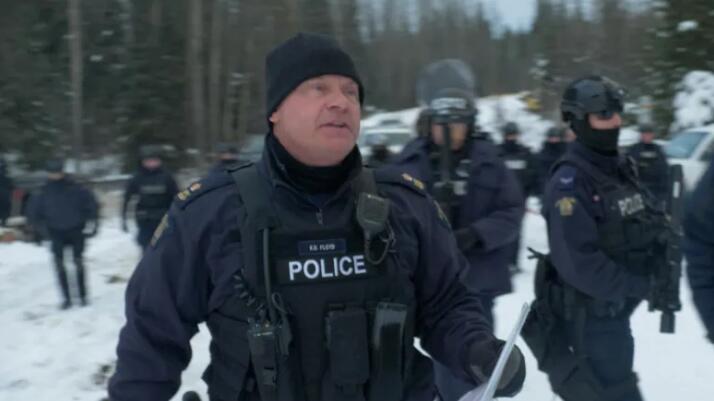RCMP, Coastal GasLink deny conspiring to intimidate, harass Wet’suwet’en members

Mounties acted ‘reasonably’ while enforcing injunction, B.C. legal defence says
The RCMP denies it conspired with a natural gas pipeline builder and a private security firm in a campaign designed to harass Wet’suwet’en people off their unceded territory in northern British Columbia, court filings say.
The RCMP, Coastal GasLink and Forsythe Security, named as defendants in a lawsuit three Wet’suwet’en members launched last June, all deny the allegations.
The $6.6-billion Coastal GasLink pipeline project is designed to carry fracked natural gas to a $40-billion LNG terminal in Kitimat, B.C., for export to Asia. Wet’suwet’en hereditary chiefs say Coastal GasLink does not have consent to cross their territory.
The latest defence filing to the lawsuit comes from B.C.’s public safety minister, the provincial politician in charge of policing, who is being represented by a Justice Canada lawyer because the claim involves the Mounties.
The minister’s 17-page response, filed after a months-long delay, says the RCMP acted “reasonably” and within the bounds of a court-ordered injunction prohibiting interference with the project.
Police increased enforcement after an “escalation of unlawful activity” that included a violent February 2022 incident involving mask-wearing, axe-wielding assailants at a pipeline construction site, the filing says.
It then offers an RCMP account of the incident. Mounties gave chase after Coastal GasLink told them roughly 20 people were threatening and attacking security personnel, but police were foiled by a roadblock of downed trees, tar-covered stumps, wire, spiked boards and debris, the filing says.
“The group ran down the road and into the trees before RCMP members were able to manoeuvre through the hazards and debris.”
Police announced no arrests since then.
- RCMP arrest 14, clear road on Wet’suwet’en territory in ongoing dispute over land rights, pipeline
- RCMP investigate alleged attack on Coastal GasLink pipeline worksite in B.C.
The subsequent increased enforcement, led by the force’s Community-Industry Response Group (C-IRG), was “commensurate with the circumstances” and not “unlawful or overzealous,” the filing says.
Plaintiffs Janet Williams, Lawrence Bazil and Sleydo’ (Molly Wickham) allege the defendants used intimidation, harassment, invasions of privacy, seizure of private property and unlawful detention in a bid to suppress law-abiding, constitutionally protected activity.
None of the allegations have been proven in court.
The events at issue unfolded at remote camps known as the Gidimt’en Checkpoint and Lamprey Village, both situated near the proposed pipeline route along a remote northern B.C. logging road.
The checkpoint is intended to re-establish Wet’suwet’en occupancy of Gidim’ten clan territory on which their ancestors lived for thousands of years, the plaintiffs say, calling it a symbol of resistance that sends an important political message.
The Lamprey Village, the plaintiffs say, is an ancient village site along the banks of the Morice River, or Wedzin Kwa, that doesn’t impede traffic on the road. Both sites are important bases from which clan members engage in traditional cultural practices, the claim says.
The minister says Mounties have seen structures at Lamprey Village that were later used in a November 2021 blockade, and says a blockade at the Gidim’ten Checkpoint was previously established despite the injunction.
Plaintiffs have no ‘proven right of property’ in area: Coastal GasLink
In a Nov. 1 amended response, Coastal GasLink also denies the allegations.
Like the minister, the builder says the project and its contractors “have been subject of an escalating campaign of unlawful acts” by the plaintiffs and their allies.
The three Wet’suwet’en plaintiffs “do not possess a proven right of property” in the Gidimt’en Checkpoint and Lamprey Village area, which “largely consists of public Crown land,” Coastal GasLink says.
The project has all necessary provincial permits alongside signed community and benefit agreements with 20 elected First Nations bands along the proposed route, the filing says.
Five of six Wet’suwet’en bands have signed such agreements, but the nation’s hereditary chiefs remain opposed to its construction.
While the pipeline builder denies it harmed Sleydo’ and the other plaintiffs, the filing says if any damages were caused, “those damages were only suffered as a result of the plaintiffs being abnormally sensitive, and would not have been suffered by an average person.”
Forsythe Security, owned by Forsythe Investments ULC and hired by Coastal GasLink, also denies “engaging in any campaign of intimidation and harassment, or any conspiracy, as alleged or at all” in a five-page response.
- RCMP has spent nearly $50M on policing pipeline, logging standoffs in B.C.
- Wet’suwet’en members sue RCMP and Coastal GasLink for alleged harassment and intimidation
The notice of claim alleges Forsythe routinely shared information, video footage and pictures with the Mounties in a joint effort to target the plaintiffs and visitors to the sites.
It says the C-IRG, an outfit founded in 2017 to police resource extraction in B.C., carried out the alleged intimidation campaign “with the full knowledge, co-operation, and assistance of Forsythe and CGL.”
The plaintiffs allege this was part of a conspiracy to harm them.
Coastal GasLink says the conspiracy claims are “scandalous, vexatious and are made without any reasonable basis in fact.”
The public safety minister says the claim contains no facts capable of proving the trio conspired to harm the Wet’suwet’en plaintiffs.
Related News
Trade war, slumping border traffic: What does that mean for the Gordie Howe bridge?
Amid U.S. President Donald Trump’s tariffs which have triggered a trade war with Canada, cross-border trips haveRead more
Trump administration threatens Harvard’s foreign enrolment, tax-exempt status
U.S. Homeland Security Secretary Kristi Noem speaks during an event on April 9, in Washington,Read more
